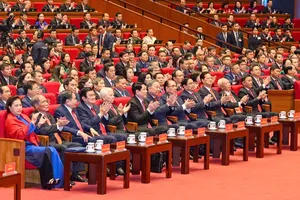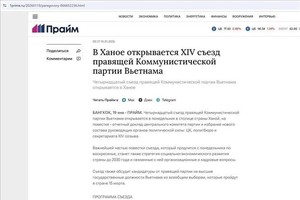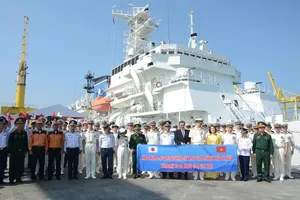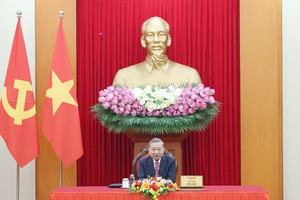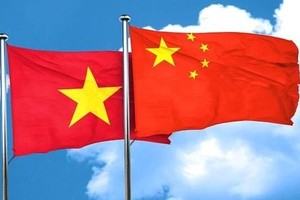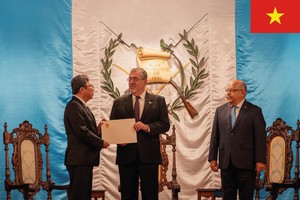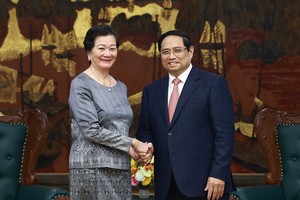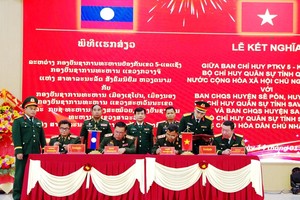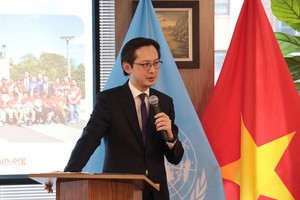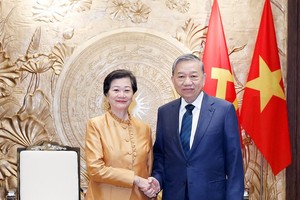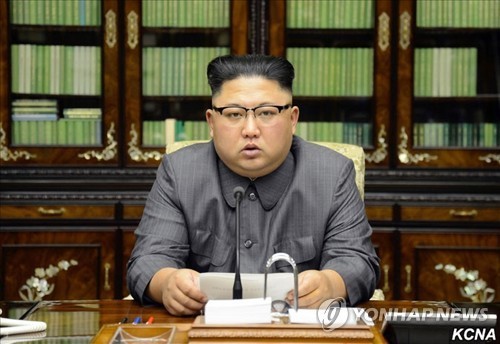
North Korean Foreign Minister Ri Yong-ho said later in New York that Pyongyang may consider the most powerful test of a hydrogen bomb over the Pacific Ocean.
In a rare direct rebuke of a U.S. leader, Kim issued a statement warning that Washington will "pay dearly" for Trump's speech delivered at the U.N. General Assembly, according to the Korean Central News Agency (KCNA).
Trump said Tuesday that he could "totally destroy" the North's regime in the face of its nuclear and ballistic missile threats. He called Kim a "Rocket Man on a suicide mission."
Kim said that his country will consider "a corresponding, highest level of hard-line countermeasure in history," the KCNA said.
"Whatever Trump might have expected, he will face results beyond his expectation. I will surely and definitely tame the mentally deranged U.S. dotard with fire," he said.
Tensions have risen amid North Korea's continued provocations, including its sixth and most powerful nuclear test on Sept. 3, in defiance of international condemnation. The wayward regime fired intercontinental ballistic missiles (ICBMs) twice in July.
The international community is stepping up sanctions and pressure on Pyongyang. Trump announced new sanctions on Thursday that target individuals and entities facilitating trade and finance with the North.
The U.N. Security Council slapped new tougher sanctions on Pyongyang last week that include a freeze on North Korea's oil imports at the current level and a ban on its textile exports.
North Korea condemned the fresh sanctions, vowing to strengthen its nuclear program at a faster pace.
Trump's bellicose warning convinced the North Korean leader that "the path I chose is correct and that it is the one I have to follow to the last," Kim said in a pledge to complete his country's nuclear force.
North Korea is seeking to develop a nuclear-tipped ICBM capable of reaching the continental U.S.
In August, Trump warned of "fire and fury" for Pyongyang after its ICBM tests. Pyongyang threatened to fire a salvo of missiles into waters near the U.S. territory of Guam, but it later held off the threat, saying that its action will depend on the U.S.’ attitude.
The U.S. has said that all options, including a military strike, are on the table, but it will seek a peaceful solution until it becomes necessary to use military force.
Experts said that North Korea is likely to further make provocative acts, including an ICBM test.
Seoul's spy agency earlier said that the North could lob an ICBM on a standard trajectory toward the North Pacific around its founding anniversary of the ruling Workers' Party of Korea on Oct. 10.
Some experts raised the possibility of an explosion test of a small nuclear warhead on a missile which would be launched toward the Pacific Ocean.
"If the North carries out such a test, the U.S. is expected to use military force and the international community will likely strongly respond to it due to risk of radioactive leaks," said Lee Choon-geun, a senior research fellow at the Science and Technology Policy Institute. "It would be difficult for the North to use such a card."
Others said that Pyongyang is more likely to fire four "enveloping" missiles around Guam as it earlier warned.
In September, the North fired a Hwasong-12 intermediate-range ballistic missile over Japan in an apparent show of its capacity to strike Guam, located some 3,400 kilometers from North Korea.
A test of an advanced missile launched from a submarine or an electromagnetic pulse (EMP) weapon could be possible, analysts said. An EMP attack involves a detonation of a nuclear weapon above the Earth with the aim of knocking out power and electronic devices.
The North's relentless provocations will likely further dampen President Moon Jae-in's efforts to seek sanctions and dialogue to resolve North Korea's nuke issues.
The North has so far rejected Seoul's offer for dialogues and inter-Korean exchanges, claiming that pressure and talks cannot go together.
"North Korea should immediately stop its reckless provocations that will lead to its own isolation and fall. It should come to the negotiation table for denuclearization," Baik Tae-hyun, spokesman at Seoul's unification ministry, told a regular press briefing, source from the Yonhap News Agency.
